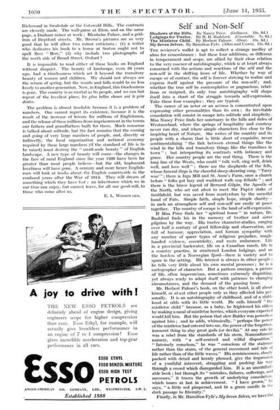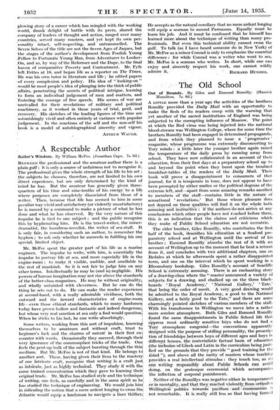Self and Non-Self
THE reviewer's wallet is apt to collect a strange medley of alms for remembrance ; but these four additions, so different in temperament and scope, are allied by their close relation to the very essence of autobiography, which is at heart always concerned with the actions and reactions of the self and the non-self in the shifting loom of life. Whether by way of escape or of contact, the self is forever striving to realize and
express itself against the pressure of the non-self ; and, whether the true self be contemplative or pugnacious, rebel- lious or resigned, its only true autobiography will shape itself into a chart of the struggle towards self-expression. Take these four examples : they are typical.
The career of an actor or an actress is concentrated upon expressing other personalities than its own ; its inevitable consolation will consist in escape into solitude and simplicity. Miss Nancy Price finds her sanctuary in the hills and dales of Westmorland, where the springs of hospitality and courtesy never run dry, and where simple characters live close to the inspiring heart of Nature. She writes of the country and its people with a charm that is little short of exquisite, never sentimentalizing " the link between eternal things like the wind in the hills and transitory things like the tramlines in town " ; but interpreting its contrasts with intimacy and grace. Her country people are the real thing. There is the long line of the Wests, who could " talk well, sing well, drink well, and love well " ; there are the shepherds of the fells, whose funeral dirge is the cheerful sheep-shearing song, "Tarry woo" ; there is Ings Mill and St. Anne's Farm, once a church before " folks gat lazy and wuddent walk oop fellside " ; and there is the brave legend of Bernard Gilpin, the Apostle of the North, who set out afoot to meet the Papist stake at Smithfield, but was saved from martyrdom by the merciful hand of Fate. Simple faith, simple hope, simple charity— in such an atmosphere self and non-self are easily at peace together. The country of escape is the land of self-expression.
If Miss Price finds her " spiritual home " in nature, Dr. Bashford finds his in the memory of brother and sister pilgrims by the way. His twelve character-studies, ranging over half a century of good fellowship and observation, are full of humour, appreciation, and human sympathy with any number of queer types of religious prejudice, rough- handed violem.e, eccentricity, and mute endurance. Life in a provincial backwater, life on a Canadian ranch, life in a country practice, in straitened London lodgings, and on the borders of a Norwegian fjord—there is variety and to spare in the setting. His interest is always in other people ;
he tells very little about his own mental processes ; he is a cartographer of character. But a pattern emerges, a picture of life, often impecunious, sometimes extremely dispiriting, yet always ready to adapt itself with patience to changing circumstances, and the demand of the passing hour.
Mr. Herbert Palmer's book, on the other hand, is all about himself, or about other people only as they affected him per- sonally. It is an autobiography of childhood, and of a child- hood at odds with its little world. He calls himself " the mistletoe child " because, as a baby, he frightened his elders by making a meal of mistletoe berries, which everyone expected would kill him. But the poison that slew Balder was powerless against him ; and he adds, whimsically, " perhaps the power
of the mistletoe had entered into me, the power of the forgotten, innocent thing to slay great gods (or devils)." At any rate he
was a rebel from the standards of his stern, Nonconformist nursery, with " a self-centred and wilful disposition." " Intensely conscious," he was " conscious of the staircase rather than the stairs, of the general movement and tide of life rather than of the little waves." His reminiscences, closely packed with detail and keenly phrased, give the impression of a youthful introvert, struggling and pushing his way through a crowd which disregarded him. It is an uncomfort• able book ; but through its "mistakes, failures, sufferings, and successes," it traces the growth of underlying consolation, which- issues at last in achievement. " I have grown," he
says, " a little red pimpernel, and lit a green candle in the dark passage to Eternity."
Finally, in Mr. Hamilton Fyfe's My Seven Selves, we have the glowing story of a career which has mingled with the working world, drunk delight of battle with its peers, shared the company of leaders of thought and action, ranged over many .countries, served many masters, and yet kept its own per- sonality intact, self-respecting, and untrammelled. The Seven Selves of the title are not the Seven Ages of Jaques, but the stages of the author's development _from Foolish Young 'Fellow to Fortunate Young Man, froM Adventurer to Looker- ,On, and so, by way of the Reformer and the Dupe, to the final haven of comparative Poverty and Contentment. Mr. Fyfe left Fettes at 18, and began life as a reporter on The Times. 'He was his own tutor in literature and life ; - he edited papers of every complexion and policy. His idea of " looking-on " .mould be most people's idea of plunging into the thick of public affairs, penetrating the secrets of political intrigue, learning to form an individual judgement of men and matters, and 'fostering the courage of free speech. His scenes of war are 'unrivalled for their revelations of military and political machinery, as it worked in those years of trial, peril, and recovery. His sketches of the leading figures of the time are astonishingly vivid and often entirely at variance with popular 'judgement. In the reactions of the self and the non-self his 'book is a model of autobiographical sincerity and vigour.
ARTHUR WAUGn.



















































 Previous page
Previous page